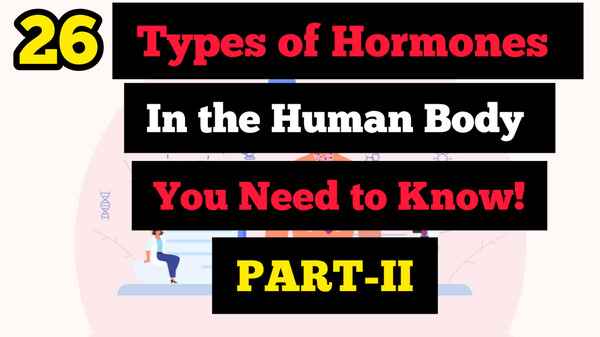Guess who did that quirky little dance in your mind and made you text your ex at 1 am? Obviously, your hormonal imbalance! Tiny messengers called hormones play an important role in keeping our bodies in balance. Let us continue our journey through 26 types of hormones, uncovering what they do and how they affect us.
So, let’s dive in and discover the importance and significance of hormones that keep our bodies in harmony and balance!
Also, Read Sexual Wellness and Better Health: 11 FAQs About Sex Marathon
14. Glucagon – Energy booster:
Glucagon is a hormone released by the alpha cells of the pancreas. Its primary role is to raise blood glucose levels when they are too low. Glucagon acts in opposition to insulin; when blood sugar levels drop, glucagon prompts the liver to break down stored glycogen into glucose and release it into the bloodstream for immediate energy use. This process ensures a continuous supply of glucose to meet the body’s energy needs, especially between meals or during periods of increased physical activity. Source
15. Androgens – The Vitality Players:
Androgens are a group of hormones, including testosterone, that are produced mainly in the testes (in men) and ovaries (to a lesser extent in women). These hormones play a vital role in the development of male reproductive organs, secondary sexual characteristics, and maintenance of male fertility. In women, androgens contribute to a variety of processes, including libido and overall vitality. Testosterone in particular is a critical hormone for men’s health, affecting muscle mass, bone density, and sexual function. Source.
Also Read: Complete Guide on Androgen Hormones: Meaning, Function, Role, and Tips for Regulation
16. Follicle Stimulating Hormone – Fertility Conductor:
FSH is released by the pituitary gland and plays a key role in reproductive function. In women, FSH stimulates the growth and maturation of ovarian follicles, which contain developing eggs. As these follicles mature, they release estrogen, contributing to the menstrual cycle and ovulation. In men, it stimulates sperm production in the testicles and supports male fertility. Source
17. Norepinephrine – The Alertness Sign Board:
Norepinephrine, like adrenaline, is produced in the adrenal medulla. It functions as a neurotransmitter and hormone that plays a key role in the body’s response to stress. Norepinephrine increases alertness, focus, and attention and prepares the body for action during times of stress or danger. Its release triggers the fight-or-flight response, allowing quick responses to potentially threatening situations.
18. Vasopressin – The Bond Enhancer:
Vasopressin, also known as antidiuretic hormone or ADH, is produced in the hypothalamus and released by the pituitary gland. It plays a key role in water balance and blood pressure regulation.
It helps the body conserve water by reducing urine production, thus preventing excessive fluid loss. It also acts on the blood vessels, constricting them to increase blood pressure when needed. In addition to its physiological functions, vasopressin is involved in social bonding and is associated with trust and attachment behavior between individuals.
19. TSH – Hi Metabolism!:
Thyroid-stimulating hormone is released by the pituitary gland and acts as a conductor of thyroid activity. TSH stimulates the thyroid gland to produce and release thyroxine (T4) and triiodothyronine (T3), thyroid hormones responsible for regulating metabolism. The correct TSH level ensures optimal thyroid function and contributes to energy production, body temperature regulation, and overall metabolic balance. Source.
20. Sex hormones – Harmony of love:
Sex hormones, including estrogen, progesterone, and testosterone, are key players in the body’s reproductive and sexual development. In women, estrogen and progesterone control the menstrual cycle and promote pregnancy.
In men, testosterone supports the development of male sexual characteristics and plays a role in fertility. These harmonious hormones control reproductive functions, sexual desire, and the formation of intimate connections between individuals.
Also Read: Complete Guide on Sex Hormones: Meaning, Function, Role and Regulation
21. Calcitonin – protector of bones:
Calcitonin is a hormone produced by the C cells of the thyroid gland. Its primary role is to regulate blood calcium levels by inhibiting the release of calcium from the bones. When blood calcium levels rise, calcitonin is released, which promotes calcium deposition in bones and reduces calcium reabsorption by the kidneys. This process helps maintain optimal blood calcium levels, ensuring proper nerve function, muscle contraction, and bone health.
22. Gonadotropin-Releasing Hormone – Reproductive Choreographer:
GnRH is produced in the hypothalamus and acts as the master conductor of the reproductive system. It regulates the release of follicle-stimulating hormone (FSH) and luteinizing hormone (LH) from the pituitary gland.
It controls the menstrual cycle in women, influencing ovulation and the production of estrogen and progesterone. In men, GnRH plays a key role in sperm production and testosterone release. Source
Also, Read Know About DMIT: Science, Facts, Research, Uses, Applications
23. Luteinizing hormone (LH) – reproductive conductor:
Luteinizing hormone (LH), released by the pituitary gland, works in conjunction with GnRH to regulate the reproductive system. In women, LH triggers ovulation and stimulates the formation of the corpus luteum, which produces progesterone. In men, LH stimulates the Leydig cells in the testes to produce testosterone. LH ensures proper reproductive function and supports fertility and the menstrual cycle.
24. Thyroid Conductor:
TRH is synthesized in the hypothalamus and plays a vital role in regulating thyroid activity. It stimulates the release of thyroid-stimulating hormone (TSH) from the pituitary gland, which in turn stimulates the thyroid gland to produce thyroid hormones (T4 and T3). These thyroid hormones control metabolism, body temperature, and energy levels throughout the body, ensuring optimal function and balance.
25. Serotonin – Joyful Harmony:
Serotonin is a neurotransmitter found primarily in the brain but is also found in the digestive system and other tissues. Often referred to as the “happiness hormone” or “mood regulator”, serotonin plays a key role in maintaining emotional well-being, and promoting feelings of happiness, contentment, and relaxation. It also regulates appetite, sleep, and various cognitive functions such as memory and learning. Source.

26. Melatonin – sleeping pill:
It is produced in the pineal gland, a small gland in the brain. As the “sleep hormone”, melatonin plays a key role in regulating the sleep-wake cycle, helping the body prepare for sleep during the night and promoting wakefulness during daylight hours. Melatonin production increases in response to darkness and decreases with exposure to light, ensuring a harmonious circadian rhythm and promoting restful sleep and overall maintenance!
In conclusion, hormones are the unsung heroes of our bodies, working tirelessly behind the scenes to ensure that every aspect of our health remains in perfect harmony. From managing stress to regulating growth, sleep, and emotions, these powerful chemical messengers play an integral role in our daily lives!
For The First 13 Hormones – Refer here





